Ross Institute & Hospital for Tropical Diseases
Bath House, Putney Heath, SW15 3NY
Medical
dates:
Medical
character:
Specialist
After a public appeal in 1923,
headed by H.H. Asquith, who had been Prime Minister at the beginning of
WW1, the Ross Institute and Hospital for Tropical Diseases opened in
1926 in Bath House, a mansion on Putney Heath. It had been
founded in recognition of the work by its Director-in-Chief, Sir Ronald Ross
(1857-1952). He had been awarded the Nobel Prize for Medicine in
1902 for his discovery in 1897, in India, of mosquito involvement in
malaria.
The Seamen's Hospital Society were unhappy about the name of the Hospital, as it was the same as its own Hospital for Tropical Diseases in Endsleigh Gardens.
The Institute and Hospital were officially opened on 15th July 1926 by the Prince of Wales.
The Institute contained research laboratories and was dedicated to the study of the treatment, propagation and prevention of tropical disease.
The Hospital had 20 beds, half of which were reserved for private patients at a charge of 5 guineas (£5.25) a week. The free wards - one male and one female - were bright and looked out onto the fine grounds of the house. The quarters for the nursing staff were very comfortable, with a bright and airy sitting room. Matron's sitting room was decorated with pink and gold hangings; beyond a large curtained arch was her bedroom painted in pink and apple green.
In the first year of its existence a variety of conditions were treated at the Hospital - dysentery, hepatitis, malaria, elephantiasis, granuloma and sprue.
Ross made several trips abroad to India, Ceylon and Malaya, but his travels ceased when he suffered a stroke in 1927.
In 1928, needing money to provide for his family, Ross advertised his research documents for sale. However, no institution would agree to his terms and conditions concerning the archive, and eventually it was bought by Lady Houston for £2,000. She offered it to the British Museum, which refused the gift, and it was decided that the papers, housed in great iron cabinets, would be of more use in the Institute.
By 1928 the number of in-patients in the Hospital had increased slightly, and there were 29 out-patients. In the following year, the number of in-patients fell, but non-tropical diseases began to be included for treatment - myositis, arthritis, gastric and duodenal ulcers, Graves' disease, malignant dermatitis, diabetes, albuminuria and haemophilia.
In 1930 the Hospital admitted cases of colitis, hookworm, jaundice, tropical ulcer, tropical eczema, encephalitis lethargica, anaemia and septic pneumonia. In 1932 'metadysentery', 'para Malta fever' (attributed to the Micrococcus paramelitensis), psoriasis, sandfly fever, debility, endocarditis and Parkinson's disease were added to the list. Despite this, the Hospital remained a financial liability as - in the 'interests of science', many free patients were accommodated for several months under observation and treatment.
In 1932 Sir Ronald Ross died.
Some fifteen months after his death, the Ross Institute was compelled to close for financial reasons.
On 1st January 1934 the Institute was incorporated into the London School of Hygiene and Tropical Medicine, whilst a Ross Ward - with 3 beds - was opened at the Hospital for Tropical Diseases.
Present status (June 2009)
The Seamen's Hospital Society were unhappy about the name of the Hospital, as it was the same as its own Hospital for Tropical Diseases in Endsleigh Gardens.
The Institute and Hospital were officially opened on 15th July 1926 by the Prince of Wales.
The Institute contained research laboratories and was dedicated to the study of the treatment, propagation and prevention of tropical disease.
The Hospital had 20 beds, half of which were reserved for private patients at a charge of 5 guineas (£5.25) a week. The free wards - one male and one female - were bright and looked out onto the fine grounds of the house. The quarters for the nursing staff were very comfortable, with a bright and airy sitting room. Matron's sitting room was decorated with pink and gold hangings; beyond a large curtained arch was her bedroom painted in pink and apple green.
In the first year of its existence a variety of conditions were treated at the Hospital - dysentery, hepatitis, malaria, elephantiasis, granuloma and sprue.
Ross made several trips abroad to India, Ceylon and Malaya, but his travels ceased when he suffered a stroke in 1927.
In 1928, needing money to provide for his family, Ross advertised his research documents for sale. However, no institution would agree to his terms and conditions concerning the archive, and eventually it was bought by Lady Houston for £2,000. She offered it to the British Museum, which refused the gift, and it was decided that the papers, housed in great iron cabinets, would be of more use in the Institute.
By 1928 the number of in-patients in the Hospital had increased slightly, and there were 29 out-patients. In the following year, the number of in-patients fell, but non-tropical diseases began to be included for treatment - myositis, arthritis, gastric and duodenal ulcers, Graves' disease, malignant dermatitis, diabetes, albuminuria and haemophilia.
In 1930 the Hospital admitted cases of colitis, hookworm, jaundice, tropical ulcer, tropical eczema, encephalitis lethargica, anaemia and septic pneumonia. In 1932 'metadysentery', 'para Malta fever' (attributed to the Micrococcus paramelitensis), psoriasis, sandfly fever, debility, endocarditis and Parkinson's disease were added to the list. Despite this, the Hospital remained a financial liability as - in the 'interests of science', many free patients were accommodated for several months under observation and treatment.
In 1932 Sir Ronald Ross died.
Some fifteen months after his death, the Ross Institute was compelled to close for financial reasons.
On 1st January 1934 the Institute was incorporated into the London School of Hygiene and Tropical Medicine, whilst a Ross Ward - with 3 beds - was opened at the Hospital for Tropical Diseases.
Present status (June 2009)
The building, situated at the corner of West Hill and Putney Heath, was demolished in the 1930s. Ross Court now occupies its site.
The stub of Putney Heath became Putney Hill when the roadway was developed.
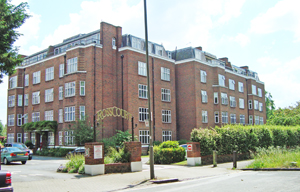
Ross Court (above and below).
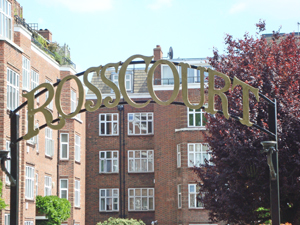
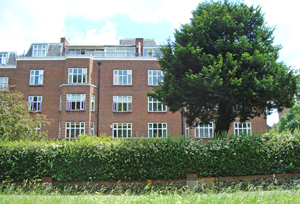
Ross Court from the west.
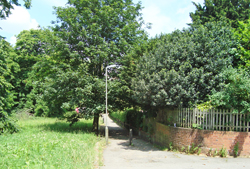
Looking down Putney Hill (above and below).
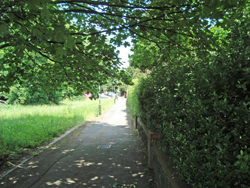
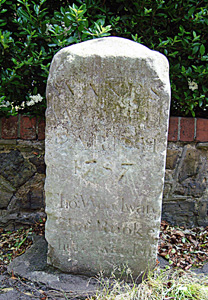
The parish boundary stone, dated 1787, beside Ross Court.
(Author unstated) 1926 The Ross Institute and Hospital for Tropical Diseases, Putney Heath, S.W.15 Science Progress in the Twentieth Century (1919-1933) 21, 324-326.
(Author unstated) 1931 The Matron of the Ross Institute, Putney, Miss Mary Gray, S.R.N., F.B.C.N. British Journal of Nursing (October), 276-277.
Cook CG 2000 Aldo Castellani FRCP (1877-1971) and the founding of the Ross Institute & Hospital for Tropical Diseases at Putney. Journal of Medical Biography 8, 198-205.
Cook GC 2001 A difficult metamorphosis: the incorporation of the Ross Institute & Hospital for Tropical Diseases into the London School of Hygiene and Tropical Medicine. Medical History 45, 483-506.
Cook GC 2007 Disease in the Merchant Navy: a History of the Seamen's Hospital Society. Oxford, Radcliffe Publishing.
Wilkinson L, Bradley DJ 2001 A note on the early history of the Ross Institute. Medical History 45, 507-510.
www.aim25.ac.uk
www.lshtm.ac.uk (1)
www.lshtm.ac.uk (2)
www.publications.parliament.uk
Return to home page